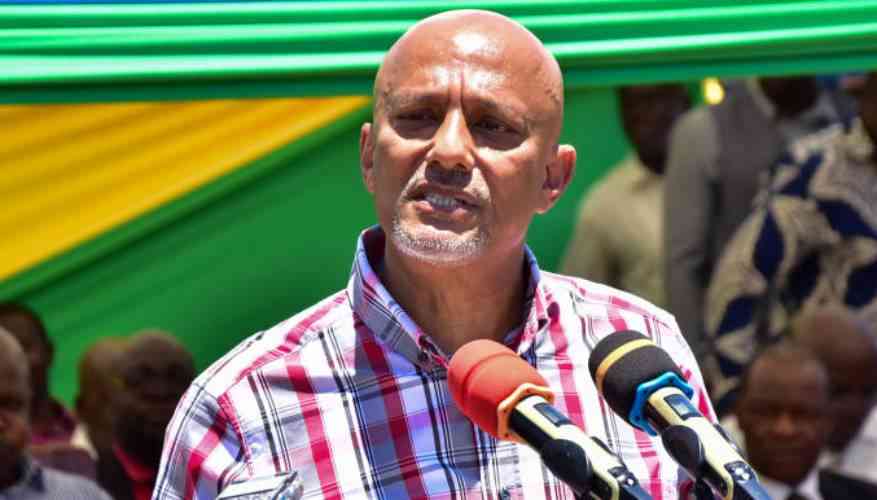By ISAIAH LUCHELI
The Government came under stinging criticism from the High Court over its appointment of Mumo Matemu as director of the Ethics and Anti-Corruption Commission (EACC).
A three-judge bench nullified Matemu’s appointment and said President Kibaki, Prime Minister Raila Odinga and Parliament ignored concerns raised about Matemu’s suitability for the office. The bench appointed by Chief Justice Willy Mutunga said said the Executive and MPs failed to investigate Matemu’s integrity and competence and opted for political expediency to push his name through.
Justices Joel Ngugi, George Odunga, and Mumbi Ngugi stated there was no doubt allegations raised against Matemu were serious and would prejudice any reasonable person’s thinking regarding his integrity or suitability to head the commission.
The judges noted despite Matemu’s appointment having been passed by Parliament, no evidence was ever was tabled to indicate what investigations, if any had been done to clear him of the serious allegations that would have seen him take office with a cloud hanging over his head.
“There was no adequate explanation why the allegations against Matemu were brushed aside in Parliament. Finally there was no attempt to craft a test which would enable the MPs determine if Matemu had passed the constitutional test under Chapter Six of the Constitution (on Leadership and Integrity),” said Justice Ngugi.
The judges also noted that Matemu appeared before a Parliamentary Committee that rejected his name, without first adducing evidence or investigating the allegations of lack of integrity made against him.
Evidence
The judge added evidence adduced in court included a letter by a Criminal Investigations Department (CID) officer who wrote to his director stating his opinion that there was substance in some of the allegations against Matemu, and urged him to dedicate more resources, including experts in forensic science, auditing and computer analysis to the case.
“This information was presented to the Director of Public Prosecutions (DPP). It is not clear whether the President and the Prime Minister in picking Matemu out of the three names submitted to them gave any consideration to this information,” read the ruling.
Mumbi explained that the right procedure for appointing anyone to a State or Public Office included weighing the qualifications and attributes of nominees or candidates against the constitutional test as contained in Chapter Six.
“Consequently, it is not possible to turn a verdict that due procedure in an appointment or nomination to a State office has been followed when there is absolutely no evidence that the appointing authority considered the constitutional test,” said the judge.
The judges added that a procedure couldn’t be deemed to have been duly followed if it appeared that from available evidence, the appointment was designed and executed in such a way that no proper inquiry into pertinent issues related to the qualification of the appointee was conducted.
“The people of Kenya did not intend that the provisions of the Constitution on integrity and suitability of people for Public Offices be merely suggestions, superfluous or ornamental, they did not intend to include these provisions as lofty aspirations,” read the 58-page judgment.
Mumbi added in the two-hour verdict that the people intended that Chapter Six should have substantive bite, and desired that it be implemented to ensure good governance in the country.
Stay informed. Subscribe to our newsletter
“It follows therefore that those organs and officials to whom the authority to select officials to certain State organs and institutions are delegated have an obligation to ensure that the persons selected for the various positions meet the criteria set out in the constitution and other legislation for those positions,” added Mumbi.
The judges added where there were allegations institutions failed to discharge their obligation as stipulated in the Constitution, the court was obligated to step in when called upon and investigate whether the process of the recruitment met the constitutional requirement.
All the allegations centre on Matemu’s tenure at the Agricultural Finance Corporation where he served as legal officer, acting company secretary and deputy chief legal officer. It is alleged he was involved in deals that resulted in AFC losing millions of taxpayers’ money.
Opposed appointment
In May, a group of MPs led by Public Accounts Committee chairman Dr Boni Khalwale opposed Matemu’s appointment in Parliament.
Assistant Minister Kabando Wa Kabando, who was also opposed to the list, was kicked out of the House before the vote because of alleged misconduct.
The House extended its sittings to facilitate the vote where Deputy Speaker Farah Maalim also voted, despite protests from Khalwale and other MPs who opposed the nomination.
“I have a conscience and that’s why I have voted on my own volition as the MP for Lagdera,” said Maalim.
Even allegations that Matemu had failed to collect Sh2.4 billion in taxes while Commissioner of Excise did not stop the Executive from rallying MPs to support his appointment.
Mr Gitobu Imanyara (Imenti Central) told his colleagues in the House Matemu was allegedly at the heart of the clique that ran down AFC through collusion with shady businessmen.
“Businessmen of Asian descent would apply for loans of between Sh18 million and Sh24 million from AFC, and then, all these loans would be written off and these loans amounted to over Sh5 billion,” Imanyara claimed.
Matemu’s appointment was later challenged in a Nakuru court where, on May 16, Justice Anyara Emukule issued temporary injunction and referred the case to Chief Justice Willy Mutunga to set up a three-judge bench in Nairobi.
Elijah Sigona of the Trusted Society of Human Rights Alliance went to court on May 15 after Parliament approved Matemu’s appointment.
The lobby group sued the Attorney General, the Minister for Justice and Constitutional Affairs and the DPP for ignoring public concerns over Matemu’s integrity during the appointment process.
They sought court orders declaring the process of Matemu’s appointment unconstitutional, illegal and a coup on the Constitution as it was devoid of consultations and democracy and therefore a disrespect of the Kenyan people.
The case was supported by claims from an agricultural contractor who accused Matemu of presiding over massive loss of public resources at AFC during his stint as its legal officer.
Rift Valley Agricultural Contractors alleged despite forwarding the detailed complaints to the DPP Mr Keriako Tobiko through the Human Rights Alliance, the allegations were ignored.
The agricultural firm alleges in 1997 when he worked at AFC, Matemu approved payment of Sh24 million on the basis of a non-existent security as the land meant to secure the loan had been sold off four years earlier.
They further accused the Director of approving two other loans of Sh18 million and Sh19.2 million using the same piece of land within the same time period monies that the firm alleged were paid to National Bank instead of AFC.
— Additional reporting by Patrick Kibet
 The Standard Group Plc is a
multi-media organization with investments in media platforms spanning newspaper
print operations, television, radio broadcasting, digital and online services. The
Standard Group is recognized as a leading multi-media house in Kenya with a key
influence in matters of national and international interest.
The Standard Group Plc is a
multi-media organization with investments in media platforms spanning newspaper
print operations, television, radio broadcasting, digital and online services. The
Standard Group is recognized as a leading multi-media house in Kenya with a key
influence in matters of national and international interest.
 The Standard Group Plc is a
multi-media organization with investments in media platforms spanning newspaper
print operations, television, radio broadcasting, digital and online services. The
Standard Group is recognized as a leading multi-media house in Kenya with a key
influence in matters of national and international interest.
The Standard Group Plc is a
multi-media organization with investments in media platforms spanning newspaper
print operations, television, radio broadcasting, digital and online services. The
Standard Group is recognized as a leading multi-media house in Kenya with a key
influence in matters of national and international interest.









